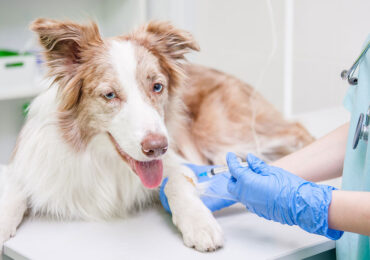Dog ownership carries many responsibilities to ensure your four-legged friend stays happy and healthy. Along with feeding, grooming, walking, and training, your dog also needs regular veterinary care to maintain good physical health, and this includes vaccinations against dangerous diseases.
Vaccines for dogs work similarly to those for humans, as they prepare your dog’s immune system to fight harmful viruses that would otherwise cause serious illness or death.
Canine vaccines fall into one of two categories: core and non-core vaccinations. In this blog, we highlight five core canine vaccines – or inoculations – that are considered vital for all dogs by the AHAA, and explain why these safe and effective doses are integral for your pet’s well-being.
Rabies Vaccine
As one of the most well-known viruses, rabies presents a serious threat to humans and dogs alike, among many other animals. Rabies is transmitted through high levels of saliva, typically from a bite of an infected animal.
Because there is no treatment for rabies, the disease means almost certain death once the infection has manifested in your dog’s body. However, this can be avoided by immunizing your dog with the rabies vaccine when it is a puppy between 12 and 16 weeks, with booster shots following every one to three years during adulthood.
Vaccine booster schedules vary with city ordinances, so chat with your local veterinarian for a recommended timeline. Our team at Grand Valley Animal Hospital recommends a three-year vaccine through our practice, but it’s extremely important for dog owners to not go even a day over three years without a booster to stay current.
Leptospirosis Vaccine
The leptospirosis vaccine is highly recommended to protect your dog from leptospirosis, a potentially fatal bacterial infection. Leptospirosis can spread through contact with contaminated water, soil, or urine from infected animals, posing a risk to both dogs and humans. This disease can cause severe damage to your dog’s kidneys, liver, and other organs. Vaccination not only helps prevent infection, but also reduces the risk of spreading the bacteria to others.
Combination Vaccine
The remaining four diseases discussed in this blog – distemper, hepatitis/adenovirus, parvovirus, and parainfluenza – are included in a combination vaccine offered at our clinic. This vaccination includes a series of three shots when your dog is a puppy, another shot when it’s one year old, and then a booster every three years to protect your dog from all four of these viruses.
Let’s dive into each of these diseases so you understand the importance of vaccinating your dog against them.

Distemper
Canine distemper is a dangerous virus that attacks your dog’s respiratory, gastrointestinal, and nervous systems when infected. Because it primarily spreads through airborne exposure (like sneezing or coughing), it can spread rapidly through unvaccinated dogs of all ages in close quarters. Even if a dog survives distemper, they may have permanent damage to their vision, nervous system, and teeth.
Hepatitis/Adenovirus
Another highly contagious disease, canine hepatitis, is passed through items contaminated by urine. If infected with this pathogen, your dog can experience sore throat, coughing, and eventually kidney and liver failure. The onset of symptoms is extremely rapid, and in some cases, death can result only two hours after initial symptoms begin.
Parvovirus
Parvovirus is a serious virus that affects all dogs, but unvaccinated puppies under six months are most at risk. Symptoms include severe vomiting, diarrhea, dehydration, dark or bloody feces, and fever. This disease is difficult to treat without veterinary intervention, and if not treated or if the dog is severely infected, the mortality rate is high. It also has lasting effects, as the disease can live on items and places that it touches for up to two years, and can only be removed with bleach.
Parainfluenza
Another threatening virus, parainfluenza causes dry cough, fever, wheezing, difficulty breathing, runny nose, sneezing, pneumonia, reduced appetite, and lethargy, as well as runny and inflamed eyes. Most dogs will recover on their own if infected, but veterinary care is still needed since the disease is extremely contagious. The vaccine does not prevent the spread of the disease, but it will limit the severity of the infection.
At Grand Valley Animal Hospital, we strongly recommend vaccinating your dog with core canine vaccines – and staying on top of booster shots – to protect your furry friend and prevent the spread of these dangerous diseases.
To sum up the vaccination information in this article based on our clinic’s practices, here’s a helpful chart:
Vaccine | Age for First Dose | Booster Timeline |
|---|---|---|
Rabies | Between 12 – 16 weeks | Every 1 – 3 years |
Leptospirosis | Series of shots as puppies and again at 1 year old | Every 1 year |
Combination (protects against canine distemper, hepatitis/adenovirus, parvovirus, and parainfluenza) | Series of shots as puppies and again at 1 year old | Every 3 years |
Our qualified veterinary staff is ready to provide information on our vaccination protocol and other preventative medicine to keep your canine healthy for years to come. To learn more about us or to schedule an appointment, contact us today at 701-757-3500!




